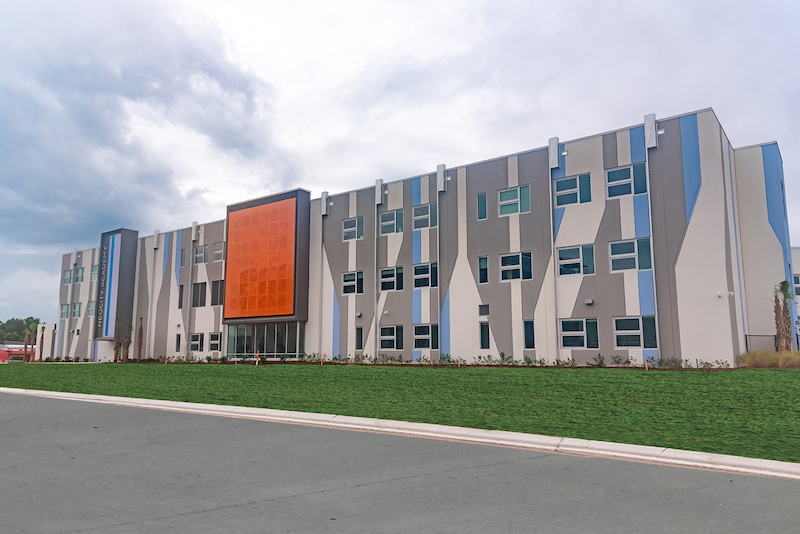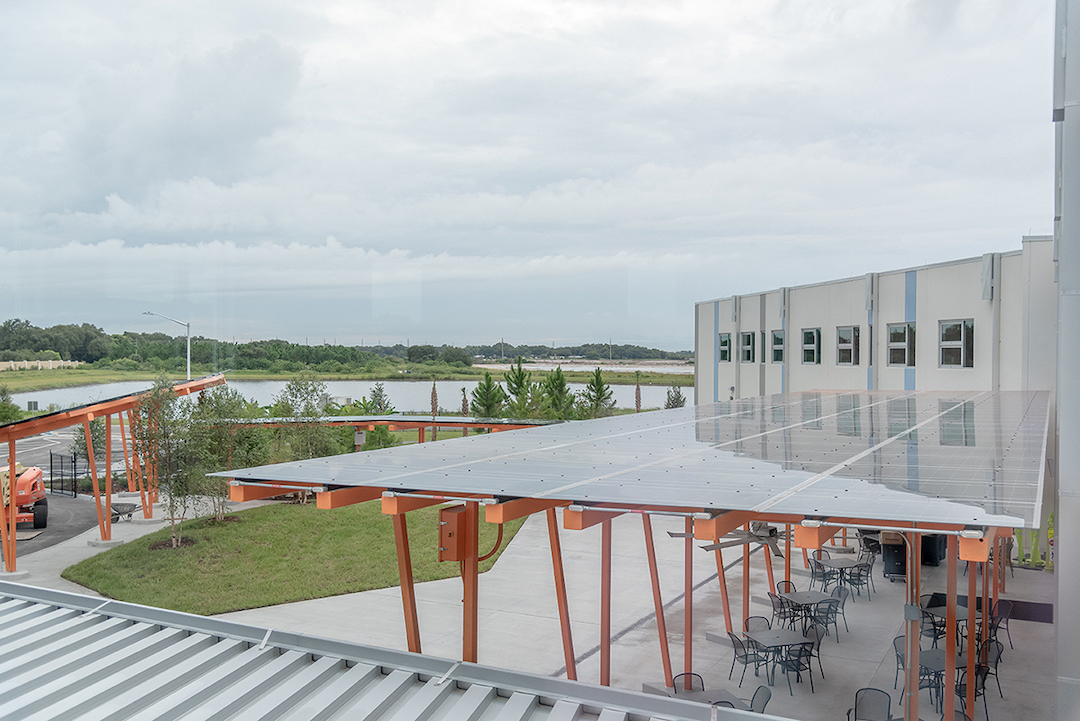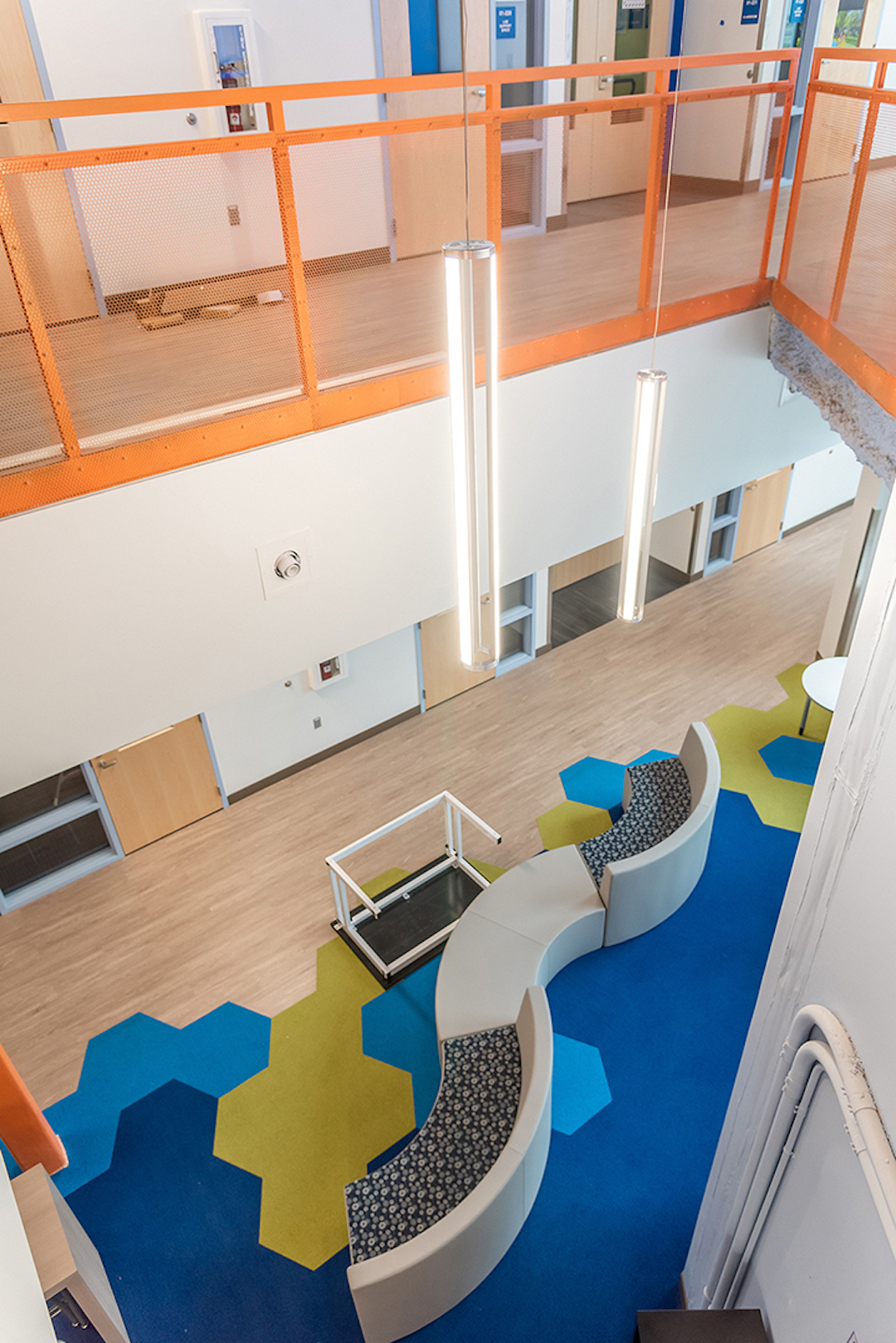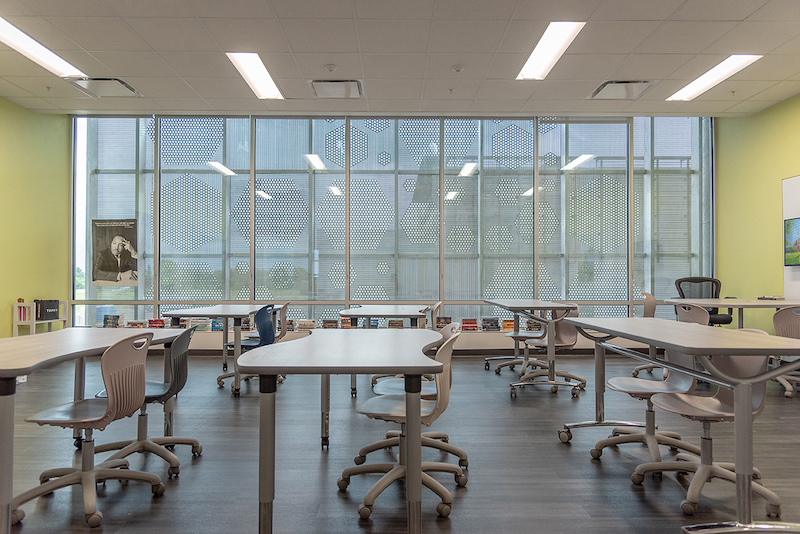A ribbon-cutting ceremony was held on August 6 for NeoCity Academy in Kissimmee, Fla., the state’s first net-zero K-12 school.
The 44,820-sf STEM school, which opens officially on August 12 for 500 students, is designed and built to use 76% less energy than a regular school, and to save $115,000 per year in energy costs. Little Diversified Architectural Consulting was the design architect and SE on this project.
NeoCity Academy’s features include a roof that hosts 650 self-ballasted solar panels that will produce 228 kW of energy. The school is targeting an Energy Use Intensity rate of 20, compared to the 65-75 EUI rate of an average building.
For Philip Donovan, Little’s project architect, NeoCity Academy is his third net-zero school. “Every project faces challenges,” he tells BD+C. “With a project like NeoCity, they are often encountered as we evaluate and choose what may be new systems and details that are not typical for client stakeholder groups or building contractors.”
At NeoCity Academy, the Building Team chose a concrete tilt-wall building envelope with 7¼-inch panels that are secured to one another and the structural steel infill; punched storefront openings, and a code minimum TPO roofing system. A very low air leakage rate was specified to allow for a reduction in the size of the mechanical systems. To ensure the building skin is as tight as possible, a new approach to the building joints, at locations where the envelope would be weakest, deployed low-tech sealant components to create redundant series of seals.
Donovan adds that Gilbane Building Company, the project’s CM at Risk, did a “tremendous job” coming up with a step-by-step manual for each detail type, which ensured that every subcontractor knew what its work should look like and what every other scope of work should look like in connection to its own.

The 44,820-sf, three-story K-12 school will serve 500 students. Image: Little
The three-story school took 16 months to design and build, at a construction cost of $13,292,000. It was delivered on time and within budget. And the building is expected to produce more energy than it consumes. The Building Team included CMTA (MEP, fire alarm engineer), Redmon Design (landscape architect), and Hanson Walters (CE).
“We have proven that there is a more cost- and energy-efficient way to build schools with minimal premiums,” says Marc Clinch, Chief Facilities Officer for Osceola School District. “The high-performance component at NeoCity Academy represents a less than six-year return on the investment and just an additional three years for the solar panels. This is phenomenal for a building that will be here for decades to come.”
The school includes an incubator/gathering area for students and teachers, and a “mixer” space that provides connections to the outdoors, the building system, and materials. The building is designed to be used as a teaching tool.
Instead of a cafeteria and to reduce operational costs, the school is incorporating a food cantina truck.
After BD+C posted this article, Clinch said that he had recently made a presentation about NeoCity Academy at an event conducted by the Florida Educational Facilities Planning Association, which represents 67 school districts in the state. “There was a lot of interest” in net-zero construction, he said. And Osceola School District has since conducted several school tours for representatives from other districts.
Clinch says that the cost of net-zero design and construction is “a no brainer” when one considers the savings in energy costs that, theoretically, could be diverted to paying teachers more at a time when school districts are struggling to control their operational costs.
He added that a key to building a successful net-zero school is building extensive and elaborate mockups, which in the case of NeoCity Academy helped to expose flaws in window installation and panel sealing before actual construction began.
 Image: Little
Image: Little

Image: Little
Related Stories
Sustainability | Feb 26, 2024
GBBN's Inflation Reduction Act Calculator goes live
GBBN has publicly released its IRA Calculator, a tool that helps you understand funding opportunities in the IRA for sustainable design.
MFPRO+ News | Feb 15, 2024
Nine states pledge to transition to heat pumps for residential HVAC and water heating
Nine states have signed a joint agreement to accelerate the transition to residential building electrification by significantly expanding heat pump sales to meet heating, cooling, and water heating demand. The Memorandum of Understanding was signed by directors of environmental agencies from California, Colorado, Maine, Maryland, Massachusetts, New Jersey, New York, Oregon, and Rhode Island.
Codes | Feb 9, 2024
Illinois releases stretch energy code for building construction
Illinois is the latest jurisdiction to release a stretch energy code that provides standards for communities to mandate more efficient building construction. St. Louis, Mo., and a few states, including California, Colorado, and Massachusetts, currently have stretch codes in place.
Sustainability | Feb 7, 2024
9 states pledge to accelerate transition to clean residential buildings
States from coast to coast have signed a joint agreement to accelerate the transition to pollution-free residential buildings by significantly expanding heat pump sales to meet heating, cooling, and water heating demand in coming years.
Sustainability | Dec 22, 2023
WSP unveils scenario-planning online game
WSP has released a scenario-planning online game to help organizations achieve sustainable development goals while expanding awareness about climate change.
Sustainability | Nov 1, 2023
Researchers create building air leakage detection system using a camera in real time
Researchers at the U.S. Department of Energy’s Oak Ridge National Laboratory have developed a system that uses a camera to detect air leakage from buildings in real time.
Hotel Facilities | Sep 15, 2023
The next phase of sustainability in luxury hotels
The luxury hotel market has seen an increase in green-minded guests looking for opportunities to support businesses that are conscientious of the environment.
Metals | Sep 11, 2023
Best practices guide for air leakage testing for metal building systems released
The Metal Building Manufacturers Association (MBMA) released a new guidebook, Metal Building Systems - Best Practices to Comply with Whole-Building Air Leakage Testing Requirements.
Regulations | Aug 23, 2023
Gas industry drops legal challenge to heat pump requirement in Washington building code
Gas and construction industry groups recently moved to dismiss a lawsuit they had filed to block new Washington state building codes that require heat pumps in new residential and commercial construction. The lawsuit contended that the codes harm the industry groups’ business, interfere with consumer energy choice, and don’t comply with federal law.
Green | Aug 7, 2023
Rooftop photovoltaic panels credited with propelling solar energy output to record high
Solar provided a record-high 7.3% of U.S. electrical generation in May, “driven in large part by growth in ‘estimated’ small-scale (e.g., rooftop) solar PV whose output increased by 25.6% and accounted for nearly a third (31.9%) of total solar production,” according to a report by the U.S. Energy Information Administration.

















